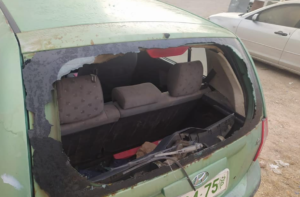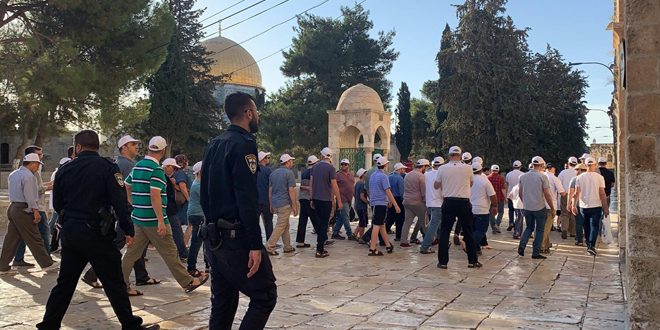Occupied Al-Quds, (ST) – Scores of police-guarded Israeli settlers broke into the Al-Aqsa Mosque compound today in occupied Al-Quds (Jerusalem) in groups and performed rituals throughout its courtyards, according to witnesses.
Witnesses told Wafa News Agency that scores of Israeli settlers entered the compound through the Moroccan Gate in groups and performed rituals and Talmudic prayers there under the protection of Israeli police officers.
Since 2003, the Israeli occupation authorities have allowed settlers into the compound almost on a daily basis, with the exception of Fridays and Saturdays, in a breach of the status quo at the holy site.
Last month alone, 4,426 Israeli settlers made their way into the holy site and prayed there, in violation of the historic status quo and signed agreements banning non-Muslim prayers at the holy site.
Israel captured East Al_Quds (Jerusalem), where Al-Aqsa Mosque is located, during the Six-Day War in 1967 in a move never recognized by the international community.
Extremist Israeli settlers vandalize vehicles in Hebron
On the other hand, in Hebron, Israeli settler fanatics last night and today vandalized and shattered the glasses and windshields of parked Palestinian-owned vehicles in the city of Hebron, south of the occupied West Bank, according to local sources.
 Manal Daana, an activist working with Israeli human rights group B’Tselem, told Wafa Agency that scores of vehicles were damaged by Israeli settlers from the illegal settlement of Kiryat Arba, illegally built on Palestinian land east of Hebron, who broke into in the southern neighborhoods of the city.
Manal Daana, an activist working with Israeli human rights group B’Tselem, told Wafa Agency that scores of vehicles were damaged by Israeli settlers from the illegal settlement of Kiryat Arba, illegally built on Palestinian land east of Hebron, who broke into in the southern neighborhoods of the city.
Israeli settlers also hurled stones at Palestinian vehicles at intersections and bypass roads across the Hebron province, causing damage to some of them.
Today’s developments are the latest in an ongoing wave of army-guarded Israeli settler terrorism across the occupied West Bank. The majority of attacks by Israeli settlers have been focused on the northern West Bank province of Nablus, which has been under Israeli siege for nearly four weeks.
Raghda Sawas

